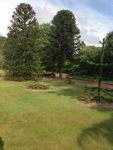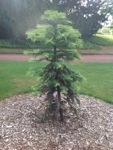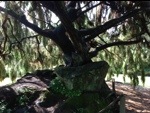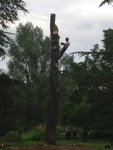By gardenpoets
‘The best part of happiness is the pines.’ So said Terri Guillemets. The best part of today were the pines too, and their relatives.
We walked around the garden, from Spain, to Chile, to Australia and Norfolk Island in the Pacific, then a short stroll up into the Himalayas, a stride across to California and then back across the Pacific to Japan, across Siberia, and home, via Norway, to Scotland. There were pines, and poems about them, all the way. All of the trees bear the name ‘pine’, although some of them are very distant relatives of our native Scots Pine, but as a poet, I am allowed to take ecological liberties.
Huge thanks to Martin Gardner, head of the Botanics’ Conifer Conservation programme, who introduced us to the various species with fascinating insights and stories. We learned that the Chile pine, more commonly known as the monkey puzzle tree, is threatened in its home territory, particularly by fire. We also learned about the Wallemi pine, known from 200 million year old fossils, but assumed extinct until a backpacker called John Noble found it while absailing into a remote Australian canyon in the 1990s. Keep your eyes peeled, there could still be trees unknown to science out there!
That 200 million year thing again… it really is the theme that won’t go away. The conifers are an incredibly ancient kind of tree. Being needly clearly works.
The Scots pine is our only native cone-bearing conifer, but we have two relatives : yew (the last tree in the Gaelic alphabet, which I will be celebrating on Sunday), and juniper, neither of which have cones as such. I spent the morning with one of the most graceful and characterful trees in the garden, a juniper from the Far East of Asia. If J ever makes it into the Gaelic alphabet, juniper will be its associated tree.
But undoubtably the highlight of the day was watching Will and his team take down a cedar tree that had died, possibly due to water logging during the summer last year. I’ve seen many trees felled in forests, by mechanical harvesters and men with chainsaws, but I’d never seen anything like this – the tree taken apart limb by limb, with great care and huge skill, ensuring the trees beside it and the turf below experienced nothing more than the odd thud and rustle. It was completely enthralling to watch, almost ceremonial. I shall toast to the cedar tonight. It had a gentle passing. And now something else will grow in its place.
Source: Walking With Poets









